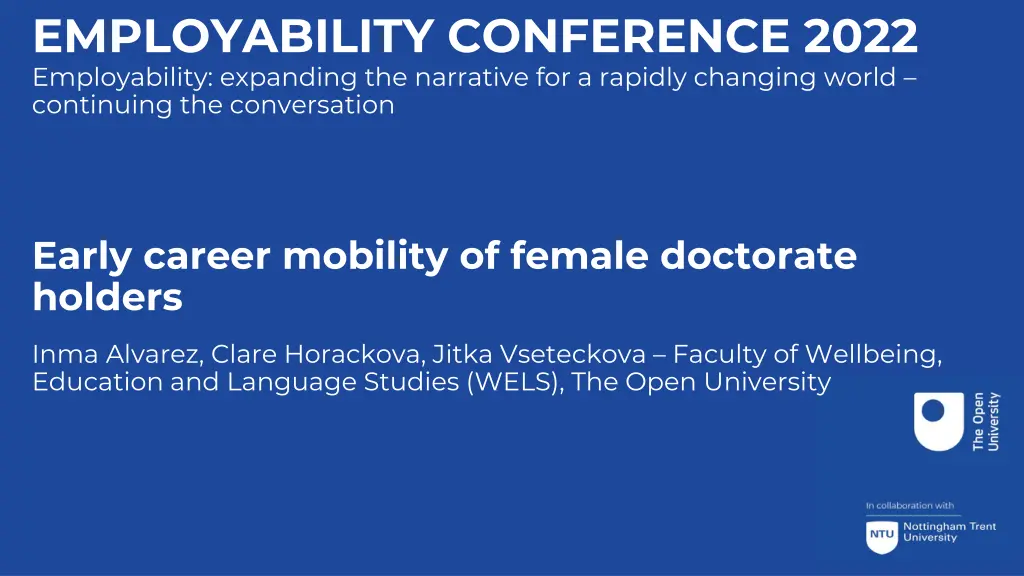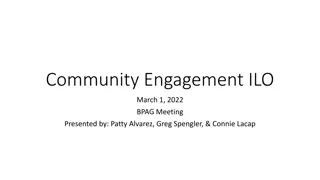
Exploring Early Career Mobility of Female Doctorate Holders
Delve into the employability experiences of female doctorate holders globally with a focus on their early career mobility, types of doctoral degrees they hold, and aspects of career mobility such as international, internal, disciplinary, and sectorial movements. The study aims to examine the research evidence on women's doctorates, career progression, and well-being. Methodology involved systematic literature searches and data screening.
Download Presentation

Please find below an Image/Link to download the presentation.
The content on the website is provided AS IS for your information and personal use only. It may not be sold, licensed, or shared on other websites without obtaining consent from the author. If you encounter any issues during the download, it is possible that the publisher has removed the file from their server.
You are allowed to download the files provided on this website for personal or commercial use, subject to the condition that they are used lawfully. All files are the property of their respective owners.
The content on the website is provided AS IS for your information and personal use only. It may not be sold, licensed, or shared on other websites without obtaining consent from the author.
E N D
Presentation Transcript
EMPLOYABILITY CONFERENCE 2022 Employability: expanding the narrative for a rapidly changing world continuing the conversation Early career mobility of female doctorate holders Inma Alvarez, Clare Horackova, Jitka Vseteckova Faculty of Wellbeing, Education and Language Studies (WELS), The Open University
Early career mobility of female doctorate holders Inma Alvarez, Clare Horackova, Jitka Vseteckova (WELS) Employability: expanding the narrative for a rapidly changing world continuing the conversation 22 March 2022
Our study Focus Employability experiences of female doctorate holders around the world Aim Examination of research evidence on: Women s types of doctoral degrees and subjects studied Their early career mobility: o Internal/ career progression o International o Disciplinary o Sectorial Their levels of well-being and general physical and mental health (Not discussed in this presentation) 3
Doctoral degrees Research question 1 What types of doctoral degrees hold female graduates and what subjects are their doctorates in? (Nerad & Heggelund 2008) PhD by published work Practice- based doctorate PhD Taught doctorate Doctorate by coursework Professional doctorate Higher doctorate Doctor of Medicine 4
Aspects of career mobility international mobility internal mobility Career mobility disciplinary mobility sectorial mobility Research question 2 What is the early career mobility of female doctoral holders? 5
Methodology Approach Systematic literature searches and narrative review Data searches ERIC Education Research Complete JSTOR Scopus Taylor & Francis Journals Online Web of Science Grey literature Types of studies All types: qualitative, quantitative, and mixed-methods Time period Published between January 1980 and January 2020 (40 years) 6
Data screening and extraction 211 Studies initially identified (177 duplicates) 36 Studies identified for full screening 23 Studies in final data extraction Selected Ackers (2004); Ahn (2014); Auriol (2007); Austin et al. (1985); Borrero et al. (2018); Bozzon et al. (2017); Ca ibano et al. (2016); Cruz-Castro and Sanz- Men ndez (2005); Fusulier et al. (2017); Gumpertz et al. (2017); Holley and Young (2005); Horner et al. (1996); Iglesias-Fern ndez et al. (2014); Ismail and Rasdi (2007); Kulis and Sicotte (2002); Lin and Chiu (2016); Maddrell, et al. (2019); Marjanovic et al. (2016); Millard (2016); Miller et al. (2005); Shinozaki (2017); Wenzel (1992); Yoon and Kim (2019). Countries Argentina, Australia, Belgium, Canada, Germany, Hungary, Italy, Latvia, Malaysia, Norway, Poland, Portugal, Slovakia, South Korea, Spain, Switzerland, Taiwan, UK, USA 7
Findings: Doctoral types and subjects What types of doctoral degrees hold female graduates? Women equal or outnumber men in terms of doctoral award Overall no clear distinction in the literature to type of doctoral degree Most references to PhDs. DSW (Doctor of Social Work) only other type of doctorate specifically listed (Holley et al, 2005). Three implicit references to Doctor of Medicine (M.D.) What subjects are their doctorates in? 5 studies across all disciplines 14 studies in STEM (including Natural and Life Sciences) 3 studies in Medicine 11 studies in Arts and Humanities, Education and Social Sciences 5 studies on a single discipline 8
Findings: Internal mobility What is the early career mobility of female doctorate holders? Barriers Slower progress and more likely to be in insecure, lower ranking positions More likely to hold part-time, temporary, fix-term, non- standard contracts Progression was less likely without periods of international mobility Dropping out of academic career for less skilled jobs More likely to be unemployed than men Promoters Equally successful to men in obtaining initial postdoctoral appointments Supportive family/partner/social networks Academic support networks and mentoring Prosperous socio-economic background Personal characteristics determination, effort 9
Findings: International mobility Characteristics Scientific careers dependent on international mobility Flow towards Westernised or English-speaking countries, and from Europe towards USA/Canada Adds transnational capital, benefits career progression (internal mobility) Short stays, nearer home, more concentrated periods More easily mobile without children Following the mobility of their partners to the detriment of their own careers Less likely/willing to be internationally mobile than men due to conflicting parenting/caring pressures Take longer than men to get a permanent position Women obtaining their doctorate abroad and returning to home country: + Improved networking opportunities and progression (Malaysia) - Held back by personal or institutional gendered and patriarchal patterns (Korea) Women obtaining their doctorate at home and moving to different country: - Negative impact on career progression (Germany) 10
Findings: Disciplinary and sectorial mobility Disciplinary (Hardly researched) One study suggested that a minority (14%) of female and male doctorate holders had a mismatch between their research field and the nature of their jobs (Cruz-Castro and Sanz-Men ndez 2005) another one noted that women may have to switch fields to secure the more desirable jobs (Kulis and Sicotte 2002, 24) Sectorial (Limited evidence) Little longer-term mobility between sectors Most likely to leave academia: o depending on field (e.g. Science, Engineering, Agriculture and Health) o to find a permanent contract o to avoid a boundaryless career o to cope with parenting demands In private sector: o lower entry salaries o lower salary progression 11
Conclusions: Early career experiences Employment pressures leading to: Poor work/life balance o dissatisfied at bearing the heavier home load, especially if partner is in demanding job role o workload pressure or living apart to achieve work mobility o work/parenting conflicts o career breaks affecting employment mobility o not taking vacation Financial difficulty caused by contracts to achieve mobility Compensated by: Types of support o from male partners or family and social networks o limited institutional support (mentoring & international career services) Personal resources 12
Acknowledgement This study has been possible due to funding by PRAXIS: WELS Scholarship and Innovation Centre Project reference: PRAXIS 2020/21 11-IA 13
References Ackers, Louise. 2004. "Managing relationships in peripatetic careers: Scientific mobility in the European Union." Womens Studies International Forum 27 (3): 189-201. Ahn, Jae-Hee. 2014. "Analysis of Women Doctorates Entering the Labor Market in Republic of Korea." In Korean Education in Changing Economic and Demographic Contexts, edited by Hyunjoon Park and Kim Kyung-keun, 59-76. Springer. Auriol, Laudeline. 2007. Labour Market Characteristics and International Mobility of Doctorate Holders: Results for Seven Countries. (Organisation for Economic Co-operation and Development). https://www.oecd-ilibrary.org/content/paper/310254328811 Austin, Ann E, Malcolm A Lowther, and Joan S Stark. 1985. "Comparative career accomplishments of two decades of women and men doctoral graduates in education." Research in Higher Education 22 (3): 219-249. Borrero, Lisa, Kathryn Berlin, and Tina M. Kruger. 2018. "Early career reflections of three female gerontologists: Motivations, perceptions, and the life course." Gerontology & Geriatrics Education 39 (4): 408-417. Bozzon, Rossella, Annalisa Murgia, and Paola Villa. 2017. "Precariousness and gender asymmetries among early career researchers: A focus on stem fields in the Italian academia." Polis (Italy) 31 (1): 127- 155. https://doi.org/10.1424/86082 Ca ibano, Carolina, Mary Frank Fox, and Otamendi F. Javier. 2016. "Gender and patterns of temporary mobility among researchers." Science and Public Policy 43 (3): 320-331. https://doi.org/10.1093/scipol/scv042 14
References Cruz-Castro, Laura, and Luis Sanz-Men ndez. 2005. "The employment of PhDs in firms: Trajectories, mobility and innovation." Research Evaluation 14 (1): 57-69. https://doi.org/10.3152/147154405781776292 Gumpertz, Marcia, Raifu Durodoye, Emily Griffith, and Alyson Wilson. 2017. "Retention and promotion of women and underrepresented minority faculty in science and engineering at four large land grant institutions." Plos One 12 (11). https://doi.org/10.1371/journal.pone.0187285 Holley, Lynn C., and Diane S. Young. 2005. "Career Decisions and Experiences of Social Work Faculty: A Gender Comparison." Journal of Social Work Education 41 (2): 297-313. http://www.jstor.org/stable/23044007 Horner, B. Elizabeth, J. Mary Taylor, Alicia V. Linzey, and Gail R. Michener. 1996. "Women in Mammalogy (1940-1994): Personal Perspectives." Journal of Mammalogy 77 (3): 655-674. https://doi.org/10.2307/1382671 Iglesias-Fern ndez, Carlos, Raquel Llorente-Heras, and Diego Due as-Fern ndez. 2014. "International mobility of Spanish doctorate-holders: What determinants matters?" Cuadernos de Economia (Spain) 37 (103): 29-44. https://doi.org/10.1016/j.cesjef.2013.03.001 Ismail, Maimunah, and Roziah Mohd Rasdi. 2007. "Impact of networking on career development: Experience of high-flying women academics in Malaysia." Human Resource Development International 10 (2): 153-168. https://doi.org/10.1080/13678860701347131 Kulis, Stephen, and Diane Sicotte. 2002. "Women scientists in academia: Geographically constrained to big cities, college clusters, or the coasts?" Research in Higher Education 43 (1): 1-30. https://doi.org/10.1023/a:1013097716317 15
References Lin, Eric S., and Shih-Yung Chiu. 2016. "Does Holding a Postdoctoral Position Bring Benefits for Advancing to Academia?" Research in Higher Education 57 (3): 335-362. https://doi.org/10.1007/s11162-015-9388-5 Maddrell, Avril, Nicola J. Thomas, and Stephanie Wyse. 2019. "Glass ceilings and stone floors: an intersectional approach to challenges UK geographers face across the career lifecycle." Geografiska Annaler: Series B, Human Geography 101 (1): 7-20. https://doi.org/10.1080/04353684.2018.1555670 Marjanovic, Sonja, Catherine A. Lichten, Enora Robin, Sarah Parks, Emma Harte, Calum Maclure, Clare Walton, and James Pickett. 2016. "How policy can help develop and sustain workforce capacity in UK dementia research: Insights from a career tracking analysis and stakeholder interviews." BMJ Open 6 (8). https://doi.org/10.1136/bmjopen-2016-012052 Millard, Debbie. 2016. "Reconciling work and family in the context of boundaryless careers: Academic careers in social sciences and humanities." Ex aequo 0 (34): 111-126. https://doi.org/10.22355/exaequo.2016.34.08 Miller, C. Chet, William H. Glick, and Laura B. Cardinal. 2005. "The allocation of prestigious positions in ororganizational science: accumulative advantage, sponsored mobility, and contest mobility." Journal of Organizational Behavior 26 (5): 489-516. https://doi.org/10.1002/job.325 Shinozaki, Kyoko. 2017. "Gender and citizenship in academic career progression: an intersectional, meso-scale analysis in German higher education institutions." Journal of Ethnic and Migration Studies 43 (8): 1325-1346. https://doi.org/10.1080/1369183x.2017.1300309 Wenzel, Stacy Ann. 1992. "Women engineering faculty: Reflections on career and success." Dissertation Abstracts International, The University of Michigan. Yoon, Hyejin, and Hyosun Kim. 2019. "Seeking a Sense of Belonging: The Exclusion of Female Doctorate Holders in South Korea and the US." Gender, Place and Culture 26 (5): 638-658. https://doi.org/10.1080/0966369X.2018.1555141 16
Thank you for listening Inma.Alvarez@open.ac.uk Clare.Horackova@open.ac.uk Jitka.Vseteckova@open.ac.uk





